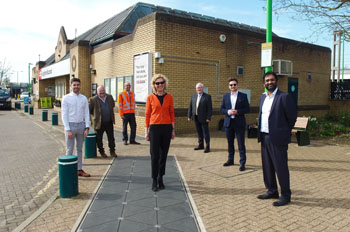Leighton Buzzard train station has become the first UK transport hub to trial the use of kinetic energy from commuters’ footsteps, under a government-funded local innovation project.
Sponsored by the Department of Transport (DfT) through the £22.9m ADEPT SMART places Live Labs Programme, the project is a UK test case of a kinetic energy system from technology firm Pavegen.

Hannah Bartram chief executive of ADEPT trying out the Pavegen walkway
Central Bedfordshire Council secured £1.05m from the Live Labs programme and has partnered with Ringway Jacobs, West Midlands Trains and Pavegen to deliver the project.
Leighton Buzzard train station has two walkways made up of kinetic floor tiles. The aim is to power two USB charging benches and a digital data screen. The data screen will show commuters their contribution and can host important messages.
Transport secretary, Grant Shapps said: 'Projects such as Pavegen are so important as we look to level-up local areas across the UK and build back greener following the pandemic.
'Putting your foot to the floor in a car has always been a way of generating power. But now, with this fantastic piece of British technology, you can do it simply by walking along a stretch of pavement and in a green and clean way, too.'
The kinetic energy technology has been installed over 200 times across 37 different countries, with applications aimed anywhere with high footfall.
The scheme is one of a number of local authority-led Live Labs - an initiative overseen by council directors body ADEPT - aiming to transform local places and highways through piloting innovation across energy, data, materials and mobility.
Cllr Ian Dalgarno, executive member for community services at Central Bedfordshire Council said: ' This trial looks at how we could use kinetic energy to power nearby highway assets and having seen the installation I am really impressed with how the Pavegen technology works. It’s our first Live Labs trial to be complete and I am certain it is something I think our residents will really engage with.'
Giles Perkins, Live Labs Programme Director said: 'The untapped footfall energy at our transport hubs represents a real opportunity to provide sustainable energy sources to power bespoke applications, while engaging audiences and encouraging behavioural change. This trial will help demonstrate the viability of the technology and could be a step change in the way transport hubs engage with commuters.'
Pavegen will be working alongside Central Bedfordshire Council to demonstrate how engagement with the project can also help local shops through a reward scheme using the Pavegen App.
Laurence Kemball-Cook, CEO, Pavegen: 'We have evolved our product to create a new and engaging mobile app platform to reward passengers for the footsteps they use. These rewards could be used to encourage footfall and get people back to retail, leisure or hospitality sections of the UK’s larger train stations. This is without losing sight of the purpose, using footsteps to create clean electricity for off-grid, bespoke solutions.'
The ADEPT SMART Places Live Labs programme is a two-year project supported by project partners SNC-Lavalin’s Atkins business, EY, Kier, O2, Ringway and WSP. Live Labs is part of ADEPT’s SMART Places programme to support the use of digital technology in place-based services.
Register now for full access
Register just once to get unrestricted, real-time coverage of the issues and challenges facing UK transport and highways engineers.
Full website content includes the latest news, exclusive commentary from leading industry figures and detailed topical analysis of the highways, transportation, environment and place-shaping sectors.
Use the link below to register your details for full, free access.
Already a registered? Login